
|
||
As previously noted, the U.S. Senate Committee on Commerce, Science, and Transportation today held a full committee hearing on ICANN’s expansion of top level domains (TLDs). The hearing was held to examine the merits and implications of the program and ICANN’s efforts to address concerns raised. ICANN will begin accepting applications for new TLDs on January 12, 2012.
In his remarks, Chairman John D. Rockefeller, U.S. Senate Committee on Commerce, Science, and Transportation, said:
“Starting in January, the Internet Corporation for Assigned Names and Numbers, commonly referred to as ICANN, is planning to allow organizations and companies to apply for any generic or brand-specific top level domain name they wish. This means that hundreds—if not thousands—of new names are going to join the familiar world of “dot com,” “dot net,” and “dot org.” Get used to “dot hotels” or “dot auto” or “dot movie,” a surge of new names and addresses that create opportunities but could also create a lot of confusion. If ICANN is determined to move forward, it should do so slowly and cautiously.”
Below are quotations from witness panel testimonies:
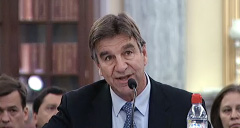 “The ICANN community has worked tirelessly to create a New gTLD Program that will introduce competition and innovation at the top level of the DNS. Thousands of pages have been carefully written, balancing expert analyses, independent study, and thousands of comments. Governments have provided advice; professionals have weighed in. The new gTLD implementation program represents opportunities for innovation and enhanced competition, with a future of stronger rights protections, stronger consumer protections, and measured paths forward to future rounds.”
“The ICANN community has worked tirelessly to create a New gTLD Program that will introduce competition and innovation at the top level of the DNS. Thousands of pages have been carefully written, balancing expert analyses, independent study, and thousands of comments. Governments have provided advice; professionals have weighed in. The new gTLD implementation program represents opportunities for innovation and enhanced competition, with a future of stronger rights protections, stronger consumer protections, and measured paths forward to future rounds.”
— Mr. Kurt Pritz, Senior Vice President of ICANN
* * *
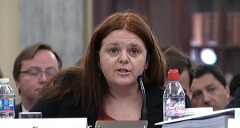 “NTIA is dedicated to maintaining an open, global Internet that remains a valuable tool for economic grown, innovation, and the free flow of information, goods, and services online. We believe the best way to achieve this goal is to continue to actively support and participate in multi-stakeholder Internet governance processes such as ICANN. This is in stark contrast to some countries that are actively seeking to move Internet policy to the United Nations. If we are to combat the proposals put forward by others we need to ensure that our multi-stakeholder institutions have provided a meaningful role for governments as stakeholders. NTIA believes that the strength of the multi-stakeholder approach to Internet policy-making is that it allows for speed, flexibility, and decentralized problem-solving and stands in stark contrast to a more traditional, top-down regulatory model characterized by rigid processes, political capture by incumbents, and in so many cases, impasse or stalemate.”
“NTIA is dedicated to maintaining an open, global Internet that remains a valuable tool for economic grown, innovation, and the free flow of information, goods, and services online. We believe the best way to achieve this goal is to continue to actively support and participate in multi-stakeholder Internet governance processes such as ICANN. This is in stark contrast to some countries that are actively seeking to move Internet policy to the United Nations. If we are to combat the proposals put forward by others we need to ensure that our multi-stakeholder institutions have provided a meaningful role for governments as stakeholders. NTIA believes that the strength of the multi-stakeholder approach to Internet policy-making is that it allows for speed, flexibility, and decentralized problem-solving and stands in stark contrast to a more traditional, top-down regulatory model characterized by rigid processes, political capture by incumbents, and in so many cases, impasse or stalemate.”
— Ms. Fiona Alexander, Associate Administrator, Office of International Affairs, National Telecommunications and Information Administration, U.S. Department of Commerce
* * *
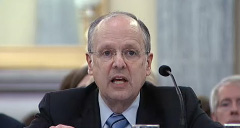 “We reject the argument of those who say that it is too late for ICANN to step back and reevaluate or for NTIA, the Governmental Advisory Committee and other key Internet participants to try to make one last major effort to forestall this potentially severely damaging initiative. There is absolutely nothing sacred about the January 2012 implementation date. Given the serious concerns expressed by a broad and growing cross-section of the entire American and global business community, the companies which provide the economic foundation of the Internet, and the potential dangers to consumers, we believe it would be irresponsible for ICANN to proceed full-speed ahead with the roll-out next month.”
“We reject the argument of those who say that it is too late for ICANN to step back and reevaluate or for NTIA, the Governmental Advisory Committee and other key Internet participants to try to make one last major effort to forestall this potentially severely damaging initiative. There is absolutely nothing sacred about the January 2012 implementation date. Given the serious concerns expressed by a broad and growing cross-section of the entire American and global business community, the companies which provide the economic foundation of the Internet, and the potential dangers to consumers, we believe it would be irresponsible for ICANN to proceed full-speed ahead with the roll-out next month.”
— Mr. Dan Jaffe, Executive Vice President, Government Relations, Association of National Advertisers, Coalition for Responsible Internet Domain Oversight
* * *
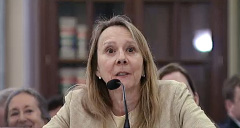 “The current domain name system in some ways is an accident of history. ICANN was created to regulate it, independently of any government and on behalf of the Internet—and world-community as a whole. Just as with fishing rights, communications spectra, taxi medallions and other «commons,» there’s a delicate balance between too few and too many domain names, which this new initiative may well upset if it goes forward without more serious study. As the old saying goes: If it ain’t broke, don’t fix it!”
“The current domain name system in some ways is an accident of history. ICANN was created to regulate it, independently of any government and on behalf of the Internet—and world-community as a whole. Just as with fishing rights, communications spectra, taxi medallions and other «commons,» there’s a delicate balance between too few and too many domain names, which this new initiative may well upset if it goes forward without more serious study. As the old saying goes: If it ain’t broke, don’t fix it!”
— Ms. Esther Dyson, Founding chairman of ICANN, 1998-2000; currently an independent angel investor
* * *
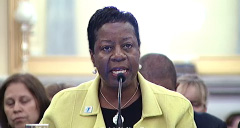 “I know that in Health Care Reform you heard the concerns of small not-for-profits and provided the same “claw back” for health insurance premiums for small not-for-profits as you have for small business. Time and again this committee has shown interest and common sense in protecting our precious not-for-profit sector from tremendous financial burden that will inhibit our ability to achieve our missions. I ask each of you to think about all the small and large not-for-profits that make our country and our world a better place to call home; our work alongside government; our work on most, if not all, of our nation’s greatest problems. I ask you to look at this issue through the lens of the not-for-profit organizations in this country who are using limited resources to do much good.”
“I know that in Health Care Reform you heard the concerns of small not-for-profits and provided the same “claw back” for health insurance premiums for small not-for-profits as you have for small business. Time and again this committee has shown interest and common sense in protecting our precious not-for-profit sector from tremendous financial burden that will inhibit our ability to achieve our missions. I ask each of you to think about all the small and large not-for-profits that make our country and our world a better place to call home; our work alongside government; our work on most, if not all, of our nation’s greatest problems. I ask you to look at this issue through the lens of the not-for-profit organizations in this country who are using limited resources to do much good.”
— Ms. Angela F. Williams, Senior Vice President and General Counsel, Young Men’s Christian Association of the United States of America
Sponsored byVerisign

Sponsored byWhoisXML API

Sponsored byIPv4.Global

Sponsored byRadix

Sponsored byCSC

Sponsored byDNIB.com

Sponsored byVerisign

If you look at the picture above, you’ll notice that several chairs were empty. Furthermore, Senator Rockefeller, Chairman of the Senate Committee on Commerce, Science, and Transportation left the meeting early, but, not until he stated that the public should get used to new gTLDs like .HOTEL and .AUTO. At least no one was caught yawning or sleeping. Might this signal a turning point on Capitol Hill?